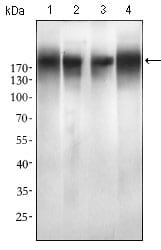
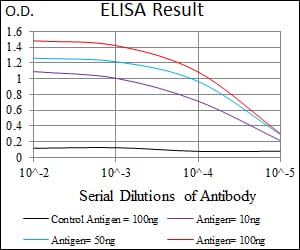
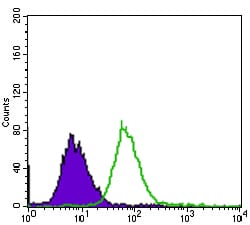
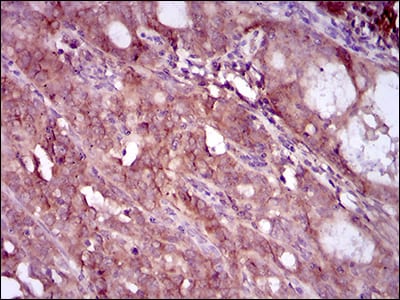
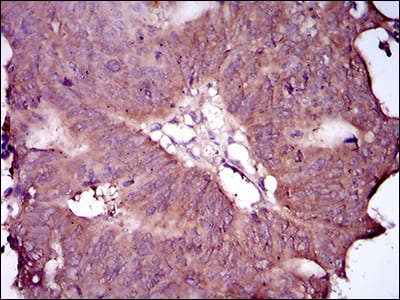
| WB | 1/500 - 1/2000 | Human,Mouse,Rat |
| IF | 咨询技术 | Human,Mouse,Rat |
| IHC | 1/200 - 1/1000 | Human,Mouse,Rat |
| ICC | 技术咨询 | Human,Mouse,Rat |
| FCM | 1/200 - 1/400 | Human,Mouse,Rat |
| Elisa | 1/10000 | Human,Mouse,Rat |
| Aliases | ERBB; HER1; mENA; ERBB1; PIG61 |
| Entrez GeneID | 1956 |
| clone | 5G9B5 |
| WB Predicted band size | 175kDa |
| Host/Isotype | Mouse IgG1 |
| Antibody Type | Primary antibody |
| Storage | Store at 4°C short term. Aliquot and store at -20°C long term. Avoid freeze/thaw cycles. |
| Species Reactivity | Human |
| Immunogen | Purified recombinant fragment of human EGFR mutant (AA: 693-893) expressed in E. Coli. |
| Formulation | Purified antibody in PBS with 0.05% sodium azide |
+ +
以下是关于EGFR突变抗体的3篇代表性文献,包含作者、标题及摘要概述:
---
1. **标题**: *Amivantamab in EGFR Exon 20 Insertion–Mutated Non–Small-Cell Lung Cancer*
**作者**: Park K, et al.
**摘要**: 该研究发表于《新英格兰医学杂志》(2021),报道了双特异性抗体Amivantamab在EGFR外显子20插入突变非小细胞肺癌(NSCLC)中的疗效。结果显示客观缓解率达40%,并证实其对传统EGFR-TKI耐药突变的治疗潜力。
---
2. **标题**: *Cetuximab and Chemotherapy as Initial Treatment for Metastatic Colorectal Cancer*
**作者**: Van Cutsem E, et al.
**摘要**: 这项III期临床试验(《新英格兰医学杂志》,2009)显示,西妥昔单抗(抗EGFR单抗)联合化疗可延长KRAS野生型(EGFR信号通路关键)转移性结直肠癌患者生存期,突显抗体对特定基因亚群患者的精准疗效。
---
3. **标题**: *Targeting EGFR Resistance Mutants in Lung Cancer: Current Status and Future Directions*
**作者**: Sequist LV, et al.
**摘要**: 综述(《Cancer Discovery》,2018)总结了针对EGFR耐药突变(如T790M和C797S)的新型抗体开发进展,包括双特异性抗体和抗体偶联药物(ADC),强调其克服小分子抑制剂耐药的潜力。
---
4. **标题**: *Antibody-Based Therapeutic Strategies for EGFR-Mutant Cancers*
**作者**: Hata AN, et al.
**摘要**: 该综述(《Nature Reviews Clinical Oncology》,2015)系统分析了抗EGFR抗体在突变驱动肿瘤中的作用机制,讨论其与化疗/免疫治疗的联用策略及耐药性问题。
---
**备注**:上述文献涵盖临床研究、耐药机制及未来方向,如需具体文章链接或更多细节,可进一步提供PMID或DOI。
Epidermal Growth Factor Receptor (EGFR) is a transmembrane tyrosine kinase receptor regulating cell proliferation, survival, and differentiation. Mutations in the *EGFR* gene, particularly exon 19 deletions and L858R substitutions, drive constitutive kinase activation, promoting oncogenesis in non-small cell lung cancer (NSCLC) and other malignancies. Targeting mutant EGFR has become a cornerstone of precision oncology.
EGFR mutant-specific antibodies are critical tools for both diagnostic and therapeutic applications. Therapeutically, monoclonal antibodies (e.g., cetuximab, panitumumab) bind EGFR’s extracellular domain to block ligand-induced signaling. However, these antibodies primarily target wild-type EGFR and show limited efficacy against tumors harboring kinase domain mutations. Tyrosine kinase inhibitors (TKIs), such as osimertinib, more directly inhibit mutant EGFR kinase activity and remain first-line therapies.
Diagnostically, mutation-selective antibodies (e.g., EGFR exon 19 deletion-specific clones) enable immunohistochemical detection of mutant EGFR in tumor samples, aiding rapid clinical decision-making where molecular testing is unavailable. Recent advancements include bispecific antibodies and antibody-drug conjugates designed to enhance tumor specificity and overcome TKI resistance mechanisms like T790M or C797S mutations.
Research continues to address challenges such as tumor heterogeneity, resistance, and on-target toxicity. The integration of mutant EGFR antibodies with next-generation sequencing and combination therapies underscores their evolving role in personalized cancer treatment.
×